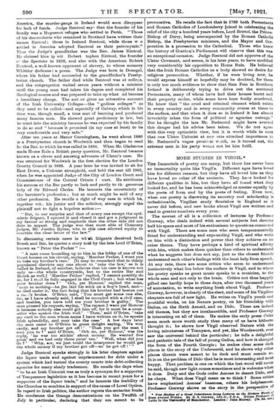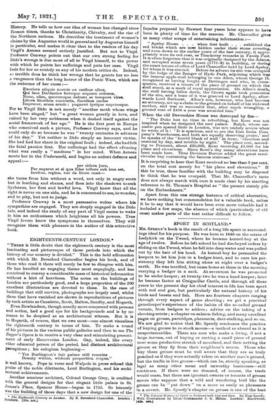MORE STUDIES IN VIRGIL.* Teal Immortals of poetry are many,
but there has never been an immortality quite like Virgil's. Different ages have loved him for different reasons, but they have all loved him as they have loved no other of the ancients. They have looked for different qualities in him, but they have all found what they looked for, and he has been acknowledged as master equally by the poets of form and by the poets of feeling. Even now, when our poetry is disowning its ancestry and scholarship is unfashionable, Virgilian study flourishes in England as it never did before, and new books about Virgil are written and read in greater numbers every year.
The newest of all is a collection of lectures by Professor Conway, who deals indeed with several subjects but devotes half his space and most of his enthusiasm to questions connected with Virgil. There are some men who seem temperamentally fitted for understanding and expounding Virgil, and who write on him with a distinction and power that they achieve on no other theme. They have perhaps a kind of spiritual affinity with him, which makes them quicker than others to understand what he suggests but does not say, just as the closest friends understand each other's feelings with the least help from speech. At any rate, there are some critics who seem to understand instinctively what lies below the surface in Virgil, and to whom his poetry speaks as great music speaks to a musician, to the whole man and not only to the brain. Critics not thus happily gifted can hardly hope in these days, after two thousand years of annotation, to write anything fresh about Virgil. Professor Conway, however, is clearly of the elect, and some of his Virgilian chapters are full of new light. He writes on Virgil's youth and youthful works, on his Nature poetry, on his friendship with Gallus, on the Sixth Aeneid, and on Dido. These are indeed old themes, but they are inexhaustible, and Professor Conway is interesting on all of them. He makes the early poem Odes seem much more worth study than many of us have hitherto thought it ; he shows how Virgil observed Nature with the loving minuteness of Tennyson, and yet, like Wordsworth, ever saw the universal behind the particular ; he tells a delightful and pathetic tale of the fall of young Gallus, and how it changed the form of the Fourth Georgic ; he makes clear some dark places in the story of the Underworld, and he shows why other places therein were meant to be dark and must remain so. Itis on the problem of Dido that he is most interesting and most happy. That problem is one on which the last word will never be said, though new light comes sometimes and is welcome when it does. Duty and the Gods order Aeneas to desert Dido, and he obeys. What does Virgil mean us to think ? Some critics have emphasized Aeneas' baseness, others his helplessness. Professor Conway shows us the story in the perspective of • New Studies of a Grist Inheritance.bein. Leetewes on the Medan Worth of Soros Ancient Writers. By B.. S. Conway, Litt.D., Hulme Professor of Latin in the University of Manchester. Leaden : John Murray. (71. 6d. net.1
History. He tells DB how our idea of woman has changed since Roman times,• thanks to Christianity, Chivalry, and the rise of the Northern nations. He describes the treatment of woman's claims by the Augustan world in general and by Augustus himself in particular, and makes it clear that to the readers of his day Virgil's Aeneas seemed entirely justified. But not to Virgil. Professor Conway points out that our own strong feeling for Dido's wrongs is due most of all to Virgil himself, to the power with which he paints her sufferings and puts her case. Virgil feels for her as acutely as any of his modem critics do. Indeed, so terrible does he think her wrongs that he grants her no less a vengeance than the long horror of the Punic Wars, which are the outcome of her curse :— Exoriare aliquis nostris ex ossibus ultor,
Qui face Dardanios ferroque saguaro colones, Nunc, olim, quocumque dabunt se tempore vireo. Litora litoribus contraria, fluctibus uncles Imprecor, arms armis ; pugnent ipsique nepotesque.
For to Virgil Dido is not merely " another moth whose wings have been singed," but " a great woman greatly in love, and ruined by her very nobleness when it dashed itself against the social framework of her age." He is the first poet in Europe who conceived such a picture, Professor Conway says, and he could only do so because he was " twenty centuries in advance of his day." Yet neither is Dido simply an innocent victim. She had had her share in the original fault ; indeed, she had felt the fatal passion first. Her sufferings had the effect of curing what was really a " madness " in her mind. When Aeneas meets her in the Underworld, and begins an ardent defence and
appeal :— per sidera juro, Per superoe et si qua fides tellure sub ima est, Invitus, regina, tuo de liters meg-
she turns from him without a word, not only in angry scorn but in loathing and shame, and flees into the shadows to seek Sychaeus, her first and lawful love. Virgil knew that all the right is never on one aide, and he is concerned to see, to wonder, and to pity, but not to judge.
Professor Conway is a most persuasive writer where his sympathies are engaged. They are deeply engaged in the Dido tale, and indeed the study of any part of Virgil seems to wake in him an enthusiasm which heightens all his powers. True Virgil lovers know the symptoms in themselves. They will recognize them with pleasure in the author of this attractive book.



































 Previous page
Previous page